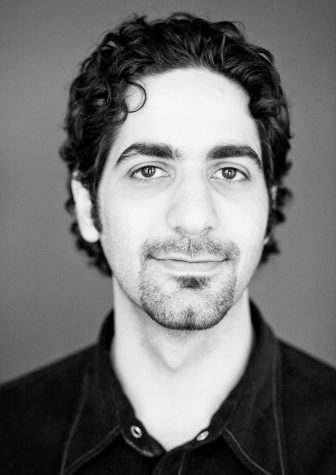Q&A: Ronnie Malley gets lost and found in ‘The Band’s Visit’
September 4, 2019

Ronnie Malley portrays the character Camal in “The Band’s Visit,” performed in Chicago Sept. 3-15.
From playing in his families band to opening a recording and production studio in Bucktown, musician and actor Ronnie Malley is now touring in the Broadway musical, “The Band’s Visit.”
“The Band’s Visit,” is about an Egyptian band that is stranded in a small, isolated town in the middle of a desert. The band, Alexandria Ceremonial Police Orchestra, is then housed by Israeli townspeople who help show the hesitant band the likenesses between the two cultures. In 2018, the musical won ten Tony awards, including the award for best musical.
One of the band members, Camal—portrayed by Malley in the musical’s first national tour—is skeptical about being stranded and is hyper-focused on going home.
All of the instrumental music for the show is done on-stage, rather than in the pit, allowing the actors to double as musicians. Malley’s main instrument is an oud, “the great-grandfather of the guitar,” Malley said.
“The Band’s Visit” will be performed in Chicago at the Cadillac Palace Theater, 151 W. Randolph St., Sept. 3 through 15.
Malley spoke with The Chronicle about his experience with the show, Chicago influences and his favorite part of the production.
THE CHRONICLE: How would you describe your character in the show?
MALLEY: He is one of the more anxious people in the group,wanting to resolve this conflict of being lost in a town, an unknown place—particularly one that may have historical or political ties to the country where he comes from, between Israel and Egypt. I can’t quite say fully that his anxiety is formed entirely by political history between the two nations but for me personally, someone who is of Middle Eastern origin, I understand that it does play a role in the character.
What has been your favorite part of the production?
I love that I’m on the stage as an actor, [and] as a musician. This show is one of the unique opportunities for actors and musicians to collaborate together. Musicians are [usually] completely apart from the actors, and here we are literally sharing the stage together.
Why do you think a story like this is important?
We live in a world today where we have access to information and social media, especially when it comes to this region. Anywhere you turn to in the news, almost everything is politicized. This is one of those very rare opportunities people will have to see how human we are in this region. What are the shared struggles they have in everyday life? What I appreciated about this story is that it does portray that in a way you can almost even replace the labels of Egyptian and Israeli with any other cultures.
How do you think your time in Chicago helped you in your career?
It formed it. I grew up playing music in a family band, and we played a lot of Middle Eastern music. My family is from Palestine, and my dad, from a young age, influenced us with music. Growing up in Chicago, we had access to all of these communities, even on microlevels, too. Chicago is paramount to my upbringing with its diversity. This is one of the first Broadway musicals to incorporate Middle Eastern instruments on stage—not to mention, Middle Eastern characters who are not stereotypes but rather people who are dignified artists from backgrounds and cultures that have influenced the entire world.







